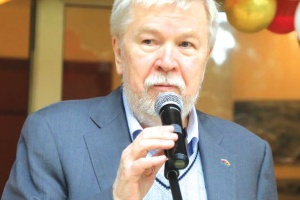Modernity is actually multi-faceted. It is based on time factor that embraces the latest art and technology, ways of behaving and thinking new, the issues that remain the core of our argument here. The use of imagination to express ideas or feeling relevant to the present time can perhaps be identified as modern art.
Man, of all creatures, is endowed with gift of imagining. He recalls the past actions and experiences and based on them, he imagines what can possibly happen in the time to come. Actions and experiences that belonged to the past, can well serve him as a stepping stone to his present endeavors and as spring board to launch him farther ahead and plan for future actions.
The present cannot always remain the present; it’s bound to file out so that the future steps in and remains there for a while until it, too, matures and becomes the past as well. The question here is ‘how does one adjust himself to modernity and avails himself to its best benefits? Does life go on as it used to be? Modernity, to most people, is acting civilized.
The word civilization has to be defined and we will proceed from there to evaluate how people conduct themselves in the way relevant to the meaning given. Obviously, the concept civilization is a state of human society that is very developed and organized. From this point of view, we observe that many of our people these days deviate from what civilization is all about.
The truth on the ground seems rather opposite to the reality of civilization, the mother of modernity. In a society that is very developed, the notion of benefiting at the expense of a fellow brother depicts nothing other than greed, the uncontrollable desire to capitalize on selfishness, which is typically inhuman or animal behavior.
By nature, animals, particularly the carnivores, how much domesticated they are, and how much they seem to be loyal, whatever comes between them and the chunk of meat is their staunch enemy and the situation ultimately becomes fatal. For instance dogs, as a matter of fact, their unkind and violent nature is fiercely lashed out even to their own masters. They viciously protect the meat at their disposal.
Considering other’s interest has no place in this particular situation what so ever. In the context of Ethiopia, most business relationship between the dealers of commodity or any other sellable items and the customers is tightly attached to the above illustration.
The ideal dealers/sellers relation is rarely functional. For the last few decades, the value of fair buying and selling, where customers are considered kings, has literally vanished. Take-it or leave-it is the predominant business culture, all to the advantage of the seller while the customer’s interest is mercilessly trampled on. In fact, the customer is at the mercy of the seller almost in every situation.
The whole issue vividly depicts that in the business relationship we have considered so far, appears as if the rights of the dealers have to be protected while that of the customer are denied. Suppose the customer wishes to buy banana, tomato or any other fruits and vegetables, first of all, it should be noted that the quality of each item is substandard and the buyer is not allowed to choose the better among the more or less rejects. The irony of it is that the customer is compelled to pay high price to obtain the items. Just for the sake of adequate survey, for instance, in the meat market, the buyer faces an annoying situation.
The cost of meat is sky-rocketing, utterly inaccessibly to the ordinary person that comprises about eight-to-ninety percent of the population. If by dint of chance he happens to buy a kilogram of meat once in a while at a very high price, he is not given good quality meat of his desire proportional to the price he pays as a matter of fact, at least about one third of it is thrown away after coming home. The other more intriguing aspect of it is that you pay the same price for the same amount of meat after three or four days, time enough for the meat to rot.
This is just minting money at the expense of the buyer disregarding the normal business principle; that is exactly what they call self-seeking greed. At this point, it not the mistake of the seller alone, the customer, out of his/her naivety, complies with the exploiting scheme of the seller.
The question why should be raised and the gut to say no should be developed. Unless there is strong resistance to restrain the circumstance, such business arrogance keeps tormenting the people infinitely, a length of time when it will be utterly impossible to reverse the situation.
The writer believes that the silence, on the part of the buyer, to fight to stop the business atrocities is attributed to cowardice wrapped in patience and politeness. When it comes to commodities, the flow starting from the importers all the way down to the retailers and the way business is handled is rather bizarre. Civilized business ethics propagates that a seller of a commodity is entitled to 20 -25% profit from the item sold.
Hence, here in Ethiopia, the practice is diametrically opposed to the ethics. In this manner, 100 – 150% net profit is targeted both from local and imported items. Such outlandish business endeavors have dominated the market environment, impoverishing the people while the business holders are unfairly enriched using their position. All-in-all, business in Ethiopia, today, has not addressed the possibility that the buyer is accessed to good quality item proportional to the extremely high prices demanded.
Nevertheless, the newly emerged wealthy, frenzied by the amount of money in their possession, most of them suffer from shoppholic syndrome; they buy anything and everything in sight as they are confused as to what to do with the wealth that suddenly engulfed them. Spending thousands of Birr overnight on women and alcoholic drinks while his/her fellow citizens staggering in dire poverty find it rather hard to piece ends together. Such economic discrepancy centers round the inevitable contradiction between command and free-market humbug. In one country, as long as command economy plays a key role, where the rich grow richer and the poor grow poorer, there can be no hope of improved life for the victims.
It is human to chase low-priced commodity to decrease expenses and maximize savings. But currently, there isn’t such a thing as cheap or expensive, everything is rather expensive. If the prices are uniform all over and continually keep rising as is the case in Ethiopia, the poor cannot cop. Such wild economic trend, unless it is checked in time, the possibility of tapping into the benefits therein becomes remote to the poor.
Owing to this fact, the financial strength of the poor has been gradually weakened. Even the question of survival, which in actual sense does not qualify the essence of living, has been at stake. To the writer, life in its crude definition is categorized into two: one – survival, which is hand-to-mouth (on the verge-of-death situation) and two – quality life. Having known the differences, the great majority of the population finds home in the survival category. Quality life, where basic needs are adequately met and out of question, has remained a dream to the poor.
The poor simply watch while the haves enjoy the undeserving blessings. They have no portion in the provision due to Birr/dollar barrier. They enjoy the odor but yearn for the taste. As aforementioned, to most people, a three-meals-a-day promise has not been materialized despite the windbag propaganda machinery relentlessly keeps blowing. Despite the mechanism to appease the sentiment of the people, citizens are reduced to absolute poverty.
Estimates suggest that 60% of the youth live below poverty line. It should be borne in mind that the youth comprise 60% of the total population. Due to the prevailing unfortunate situation, they have resorted to the use of addictive substances to subdue their feelings and seemingly get rid of depression. Chat and other similar drugs are very difficult to obtain due to the high cost which the victims cannot afford.
This in itself places an inaccessibility challenges and provokes illegal means to obtain them. The two possible options to do so are theft or robbery that put them at loggerhead with the law, making the prison their ultimate home. What a grave situation! Although there was a claim of the reduction of the percentage of people below poverty line in the country to 30%, the grim actuality of the situation shows about 70 – 80% is dangling in it.
It should be noted that the picture is blurred by the remittances from abroad that made life somewhat bearable to many; otherwise the situation could have been far worse than the estimation indicated.
In this context, where does modernity lie if it is the manifestation of civilization? So long as civilization, in its true meaning, is believed to bring positive changes in people’s life and behavior, why do we witness the retraction at least from the promises originally made to the people? Is modernity, in the context of civilization, looking down upon patriots or fellow countrymen and women and trampling their rights and privileges? Where do the perpetrators stand when the dust of corruption finally settles?
The dust does not keep blowing forever. The law of nature dictates that something starts somewhere and is definitely bound to ends elsewhere. It is the strong stand of the writer that such deplorable act must be dealt with the punitive measure of justice and in the process the market price must be regulated before all the impoverished go out into the street begging.
Herald February 24/2019
BY JOSEPH SOBOKA





